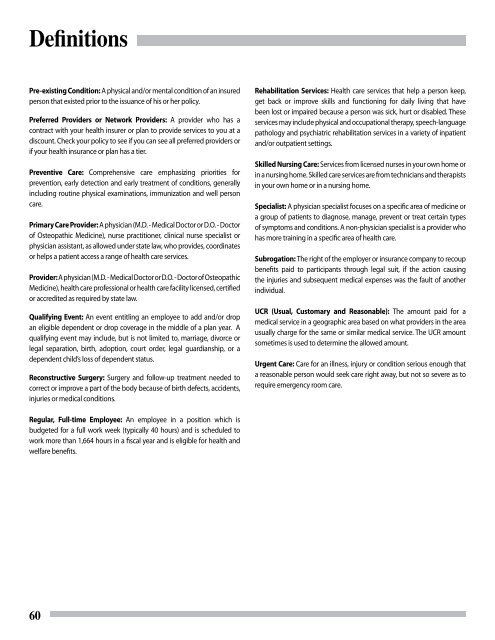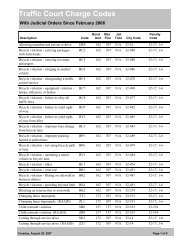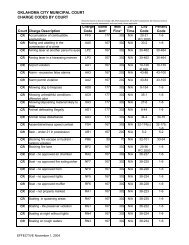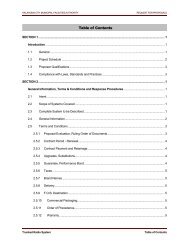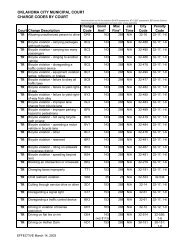Employee Benefit Guide 2012 - City of Oklahoma City
Employee Benefit Guide 2012 - City of Oklahoma City
Employee Benefit Guide 2012 - City of Oklahoma City
You also want an ePaper? Increase the reach of your titles
YUMPU automatically turns print PDFs into web optimized ePapers that Google loves.
Definitions<br />
Pre-existing Condition: A physical and/or mental condition <strong>of</strong> an insured<br />
person that existed prior to the issuance <strong>of</strong> his or her policy.<br />
Preferred Providers or Network Providers: A provider who has a<br />
contract with your health insurer or plan to provide services to you at a<br />
discount. Check your policy to see if you can see all preferred providers or<br />
if your health insurance or plan has a tier.<br />
Preventive Care: Comprehensive care emphasizing priorities for<br />
prevention, early detection and early treatment <strong>of</strong> conditions, generally<br />
including routine physical examinations, immunization and well person<br />
care.<br />
Primary Care Provider: A physician (M.D. - Medical Doctor or D.O. - Doctor<br />
<strong>of</strong> Osteopathic Medicine), nurse practitioner, clinical nurse specialist or<br />
physician assistant, as allowed under state law, who provides, coordinates<br />
or helps a patient access a range <strong>of</strong> health care services.<br />
Provider: A physician (M.D. - Medical Doctor or D.O. - Doctor <strong>of</strong> Osteopathic<br />
Medicine), health care pr<strong>of</strong>essional or health care facility licensed, certified<br />
or accredited as required by state law.<br />
Qualifying Event: An event entitling an employee to add and/or drop<br />
an eligible dependent or drop coverage in the middle <strong>of</strong> a plan year. A<br />
qualifying event may include, but is not limited to, marriage, divorce or<br />
legal separation, birth, adoption, court order, legal guardianship, or a<br />
dependent child’s loss <strong>of</strong> dependent status.<br />
Reconstructive Surgery: Surgery and follow-up treatment needed to<br />
correct or improve a part <strong>of</strong> the body because <strong>of</strong> birth defects, accidents,<br />
injuries or medical conditions.<br />
Rehabilitation Services: Health care services that help a person keep,<br />
get back or improve skills and functioning for daily living that have<br />
been lost or impaired because a person was sick, hurt or disabled. These<br />
services may include physical and occupational therapy, speech-language<br />
pathology and psychiatric rehabilitation services in a variety <strong>of</strong> inpatient<br />
and/or outpatient settings.<br />
Skilled Nursing Care: Services from licensed nurses in your own home or<br />
in a nursing home. Skilled care services are from technicians and therapists<br />
in your own home or in a nursing home.<br />
Specialist: A physician specialist focuses on a specific area <strong>of</strong> medicine or<br />
a group <strong>of</strong> patients to diagnose, manage, prevent or treat certain types<br />
<strong>of</strong> symptoms and conditions. A non-physician specialist is a provider who<br />
has more training in a specific area <strong>of</strong> health care.<br />
Subrogation: The right <strong>of</strong> the employer or insurance company to recoup<br />
benefits paid to participants through legal suit, if the action causing<br />
the injuries and subsequent medical expenses was the fault <strong>of</strong> another<br />
individual.<br />
UCR (Usual, Customary and Reasonable): The amount paid for a<br />
medical service in a geographic area based on what providers in the area<br />
usually charge for the same or similar medical service. The UCR amount<br />
sometimes is used to determine the allowed amount.<br />
Urgent Care: Care for an illness, injury or condition serious enough that<br />
a reasonable person would seek care right away, but not so severe as to<br />
require emergency room care.<br />
Regular, Full-time <strong>Employee</strong>: An employee in a position which is<br />
budgeted for a full work week (typically 40 hours) and is scheduled to<br />
work more than 1,664 hours in a fiscal year and is eligible for health and<br />
welfare benefits.<br />
60


